Professor Dapo Akande: United Kingdom candidate for the International Court of Justice 2027 to 2036
Published 22 October 2024
Foreword by the United Kingdom Prime Minister
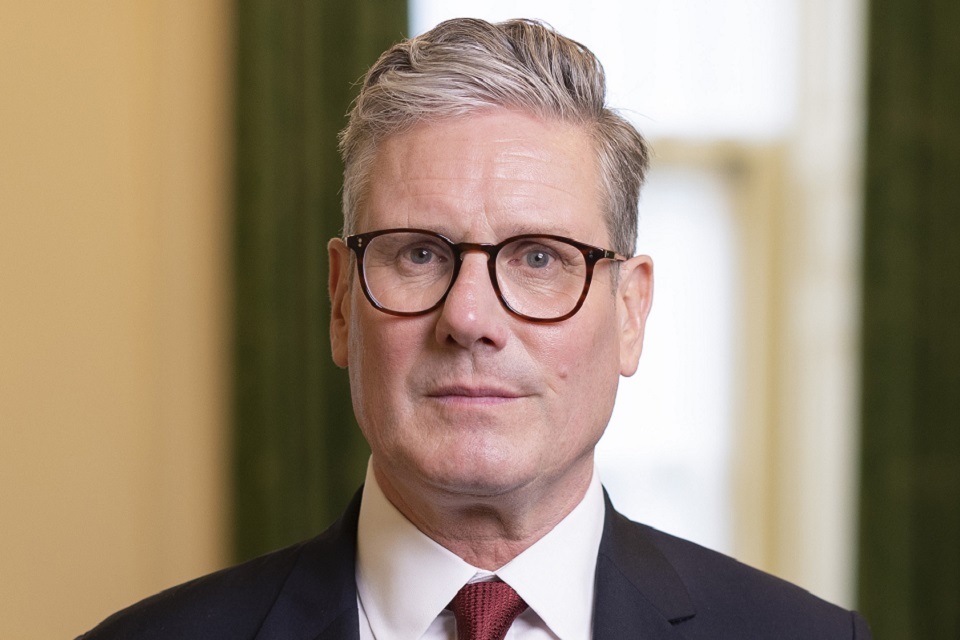
Prime Minister Sir Keir Starmer.
I am delighted to commend to you the United Kingdom National Group’s candidate, Professor Dapo Akande, for election as a judge to the International Court of Justice (ICJ) for the term 2027 to 2036. I am personally committed to strengthening international rule of law and the institutions that support it. As a member of the International Law Commission and a renowned legal scholar and practitioner of international law, Professor Akande is exceptionally well-qualified for this role. I believe he would make a formidable judge on the ICJ.
Professor Akande has advised governments from States in each of the 5 United Nations’ regional groups, as well as international organisations, including the UN and the African Union.
Professor Akande is the Chichele Professor of Public International Law and Fellow at All Souls College Oxford. He is a widely‑published author and researcher and sits on the advisory or editorial boards of international law periodicals in Europe, America, Africa and Asia. He is regularly invited to address legal and political bodies of international organisations, such as the UN Security Council, the Committee of Legal Advisers on Public International Law of the Council of Europe and the annual UN meeting of principal legal advisers of foreign ministries.
Professor Akande originally qualified as a lawyer in Nigeria and has extensive interest and expertise in a wide swathe of international legal issues. He has acted as counsel, adviser or expert in several high‑profile cases before a range of international courts and tribunals, including the ICJ. As an independent practitioner, Professor Akande has advised governments from States in each of the 5 United Nations’ regional groups, as well as international organisations, including the UN and the African Union.
Professor Akande is currently serving as an elected member of the prestigious International Law Commission. He brings a wealth of experience from his 25 years of teaching and practising international law. He is eloquent in explaining the importance of international law to a wide variety of audiences and contributing to its application.
The United Kingdom strongly supports the work of the ICJ in upholding the rule of law and contributing to peaceful settlement of disputes. The Court is experiencing one of the most dynamic periods in its history with an increased caseload and an unprecedented level of public interest in its work. I am confident that Professor Akande’s experience, his independence and his vision for the Court will help guide the ICJ in its important work in the years ahead. I wholeheartedly endorse his candidacy for a seat on the ICJ and I hope you will vote for him in autumn 2026.
Keir Starmer Prime Minister of the United Kingdom of Great Britain and Northern Ireland
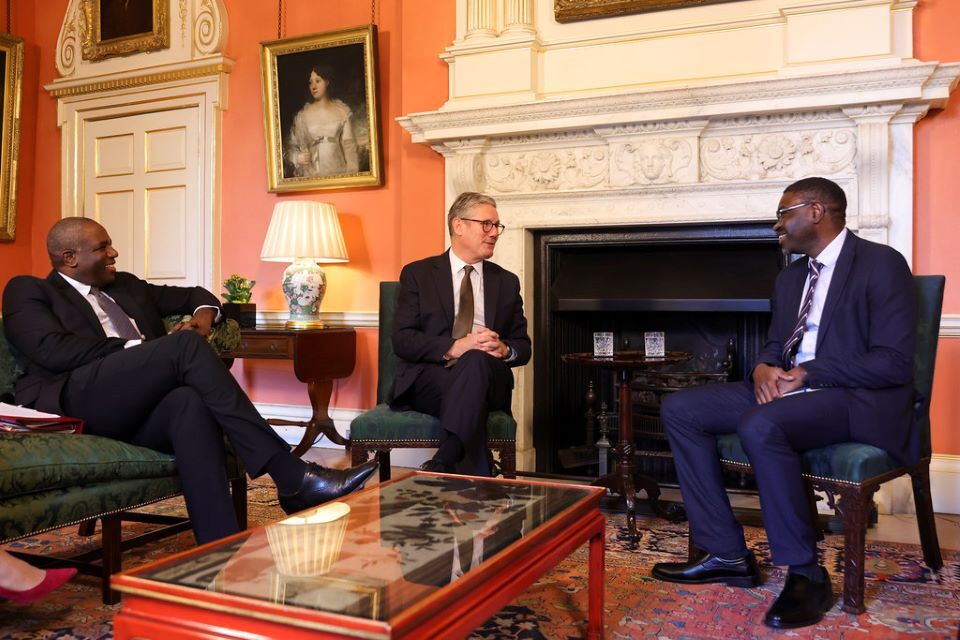
Professor Dapo Akande with Prime Minister Keir Starmer and the Rt Hon David Lammy MP.
Statement by the Rt Hon David Lammy MP
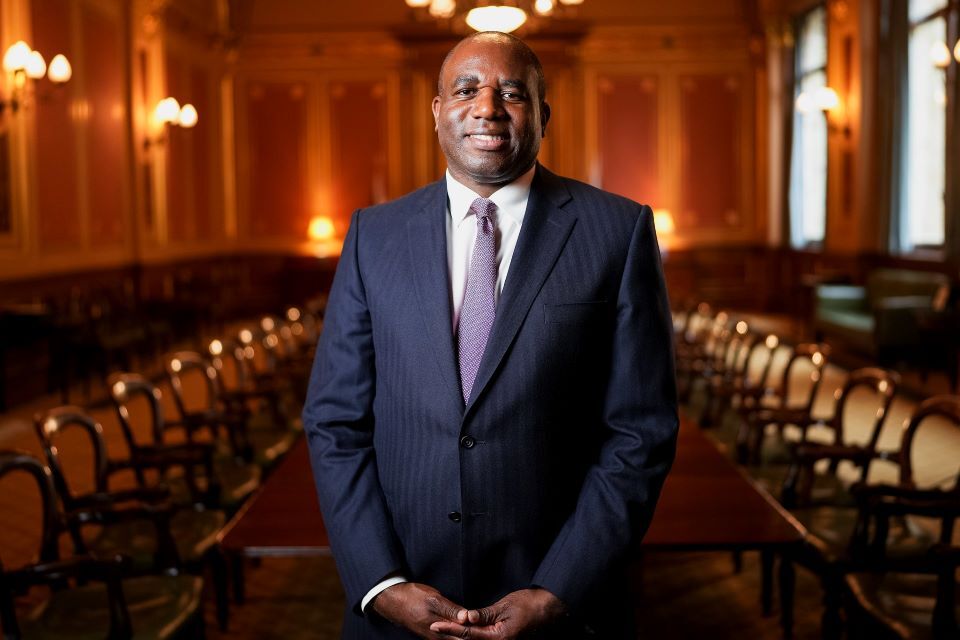
The Rt Hon David Lammy MP.
Respect for international law and the rule of law is in Britain’s DNA. Having practised as a barrister in the UK, and as an attorney in the US, I have a deep, personal respect for the institutions which underpin this order. In order for the ICJ to deliver for our citizens in the future, it is vital that it draws on the very best legal expertise from around the world.
That is why I am delighted to announce that the UK National Group will nominate Professor Dapo Akande to be elected as a judge at the ICJ in 2026. Professor Akande is an outstanding candidate who represents the very best of UK legal expertise. He brings a wealth of experience advising national governments and international organisations on some of the most challenging issues of contemporary international law.
As a member of the UN International Law Commission, and having advised the African Union, Commonwealth Secretariat and ASEAN, Professor Akande has shown he will work collegiately in co‑operation with international partners across the world to uphold the rule of law.
I hope you will support his candidacy.
Introductory statement by Professor Dapo Akande
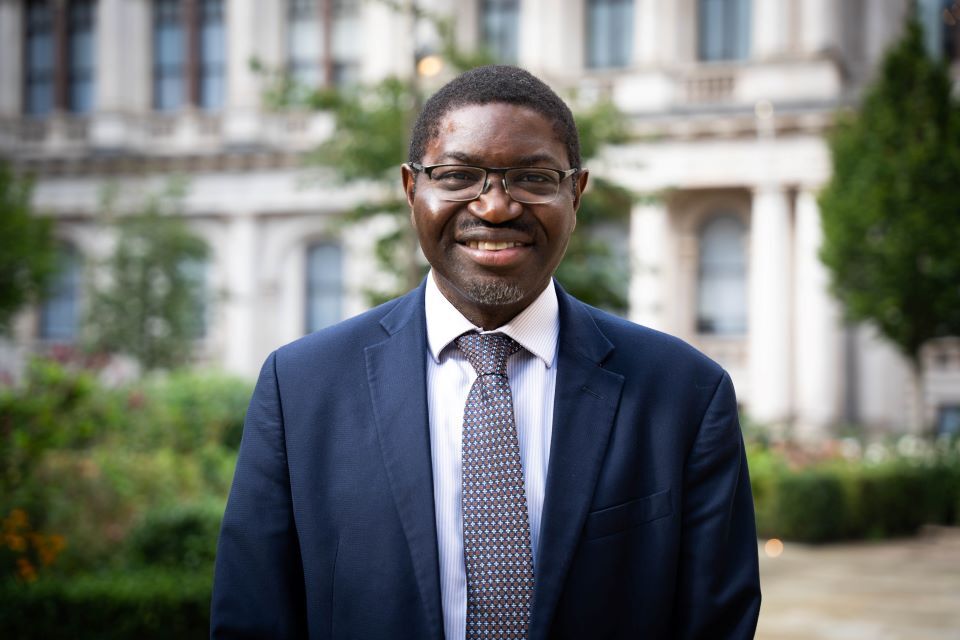
I am deeply honoured to be nominated as a candidate for election as a judge of the ICJ. As the principal judicial organ of the United Nations, the Court has the important functions of assisting States to resolve their disputes by peaceful means on the basis of international law, and providing advisory opinions to United Nations organs. It has been a privilege to appear before the Court in both types of proceedings.
If elected, it would be an even greater privilege to contribute to the work of the Court, as it plays its part in fulfilling the goals of the United Nations, including developing friendly relations among nations and ensuring respect for human rights. The increasing number of cases submitted to the Court and the great number of States taking part in proceedings before it in recent years, is testament to the faith placed in the Court to uphold the rule of law in international affairs.
Throughout my career, and especially in my work as a member of the United Nations International Law Commission, I have demonstrated that same commitment to advancing the rule of international law.
Global experience as scholar and practitioner
If elected to serve on the ICJ, my contribution to its work would draw from the combination of my extensive academic and practical experience around the world. In scholarly work, I have sought to understand, and to explain, as clearly as possible, and to as wide an audience as possible, the importance of international law in achieving a peaceful, just and secure world.
I have gained significant experience of international law from acting as counsel or expert in cases before a range of international courts and tribunals. In addition to the ICJ, I have acted in cases before the International Tribunal for the Law of the Sea, the European Court of Human Rights, the African Court of Human and Peoples’ Rights and the World Trade Organization Dispute Settlement Panels. I am also on the panel of arbitrators for the International Centre for the Settlement of Investment Disputes. My practice in international adjudication has led me to being intimately familiar with the law and procedure applicable to the work of the ICJ.
I am regularly called upon to provide advice on international law to States, international organisations and civil society organisations. I have been adviser to States located in all of the United Nations’ regional groups. I have also been asked to advise several United Nations as well as regional bodies such as the African Union, the Council of Europe, the Association of Southeast Asian Nations, and the Organization of American States. This experience has contributed to an understanding of the needs of States and those of the broader international community.
If elected, I will decide cases on the basis of a faithful and impartial application of the law having listened carefully to the arguments of participants in the proceedings.
While my initial legal training was in Nigeria, I have held academic positions in British Universities for over 25 years and I am currently the Chichele Professor of Public International Law at the University of Oxford. I have benefitted immensely from working as a visiting academic in common law and civil law jurisdictions. As a scholar, I have served on the editorial boards of the leading international law journals from around the globe, including the African Journal of International and Comparative Law, the European Journal of International Law and the American Journal of International Law.
I have also had the privilege of being a regular teacher on various programmes providing training on international law to government lawyers including the UN Regional Courses on International Law for the Latin America and the Caribbean and Asian regions, the Seoul Academy of International Law and the Tokyo International Law Seminar. My involvement in international law programmes from across the globe has enabled me to have a clearer appreciation of how the rules of international law are understood in different parts of the world.
Generalist international lawyer
I am a public international lawyer with experience of a wide range of topics within the field of international law. My work has ranged from areas such as the law of armed conflict, international criminal law, human rights law, and the law of international organisations to boundary disputes and international economic law (including trade and investment law). I am confident that an orientation as a generalist international lawyer, with interests in all aspects of international law, helps to see connections between different aspects of the field of international law, and will be of assistance at the ICJ, a court with jurisdiction across the breadth of international law.
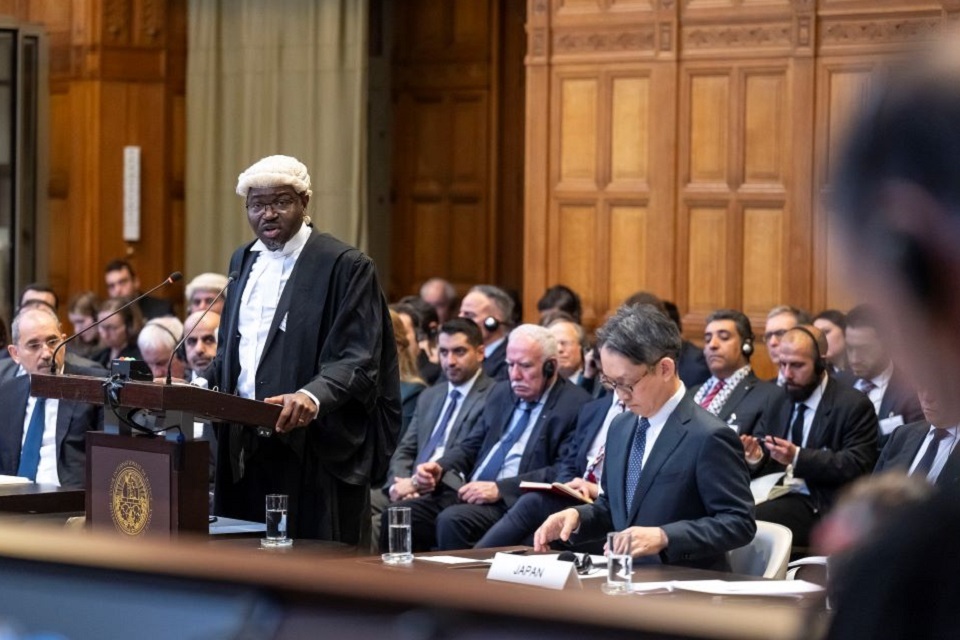
Professor Dapo Akande at the International Court of Justice.
Collegiality
Over the course of my career, I have contributed to the work of legal bodies that aim, like the ICJ, to produce legal texts developed on the basis of collective work by many individuals. I have acquired significant experience in building consensus on questions of international law in groups drawn from diverse backgrounds.
My experience working across different legal traditions has greatly supported my ability to find common ground, while preserving the integrity of international law. In my time on the United Nations International Law Commission, I have worked in a constructive and collaborative manner to bring colleagues together to produce authoritative and faithful interpretations of the law. I have also demonstrated similar skills as a leader or member of the projects that produced the UN OCHA Oxford Guide to the Law Relating to Humanitarian Relief Operations in Armed Conflict and the Tallinn Manual on International Law Relating to Cyber Operations, and as co-convenor of the Oxford Process on International Law Protections in Cyberspace.
Independence and faithful application of the law
I am committed to legal rigour and to upholding the highest standards of legal analysis in international law. I am equally committed to preserving the integrity and independence of the ICJ.
If elected, I will decide cases on the basis of a faithful and impartial application of the law having listened carefully to the arguments of participants in the proceedings.
Professor Dapo Akande: Curriculum vitae
Professional affiliations
- University of Oxford: Chichele Professor of Public International Law; Fellow, All Souls College (2023 to date); Co-Director, Oxford Institute for Ethics, Law and Armed Conflict (2009 to date)
- Member, United Nations (UN) International Law Commission (2023 to 2027)
- Member of the Panel of Arbitrators appointed by the Chair of Administrative Council, International Centre for the Settlement of Investment Disputes (World Bank Group) (2024 to date)
- Barrister, Essex Court Chambers, London (2020 to date)
Prior academic experience
University of Oxford
- Professor of Public International Law (2014 to 2023)
- University Lecturer in Public International Law, then Associate Professor (2004 to 2014)
- Fellow at St Peter’s College, then Exeter College, Oxford (2004 to 2023)
- Co-Director, Oxford Martin Programme on Human Rights for Future Generations (2013 to 2017)
- Co-Director, Oxford University/George Washington University Summer School on Human Rights Law (2007 to 2010)
- Director of Studies in Law, Regent’s Park College (2006 to 2008)
Other UK universities
- Lecturer in Law, University of Durham (2000 to 2004) and University of Nottingham (1998 to 2000)
- Supervisor in International Law, Christ College and Wolfson College, University of Cambridge (1996 to 1998)
- Class Teacher and Research Assistant, London School of Economics and Political Science (1994 to 1996, 1997 to 1998)
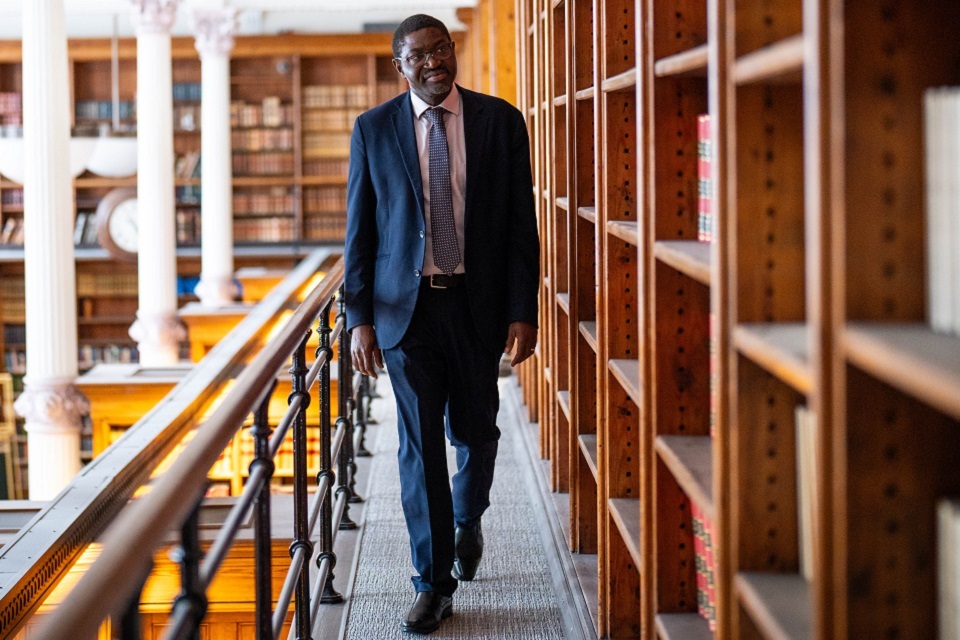
Visiting professor and lectureships
- University of Vienna (2018)
- Católica Global School of Law, Lisbon (2014 to 2018)
- Sir Ninian Stephen Visiting Scholar, University of Melbourne Law School (2015)
- University of Miami School of Law (2002, 2009); Associate Professor of Law and Robina Foundation International Fellow, Yale Law School (2008 to 2009);
- Director, Nuremberg Summer Academy, International Nuremburg Principles Academy (2015)
- University of Edinburgh (2000 to 2003)
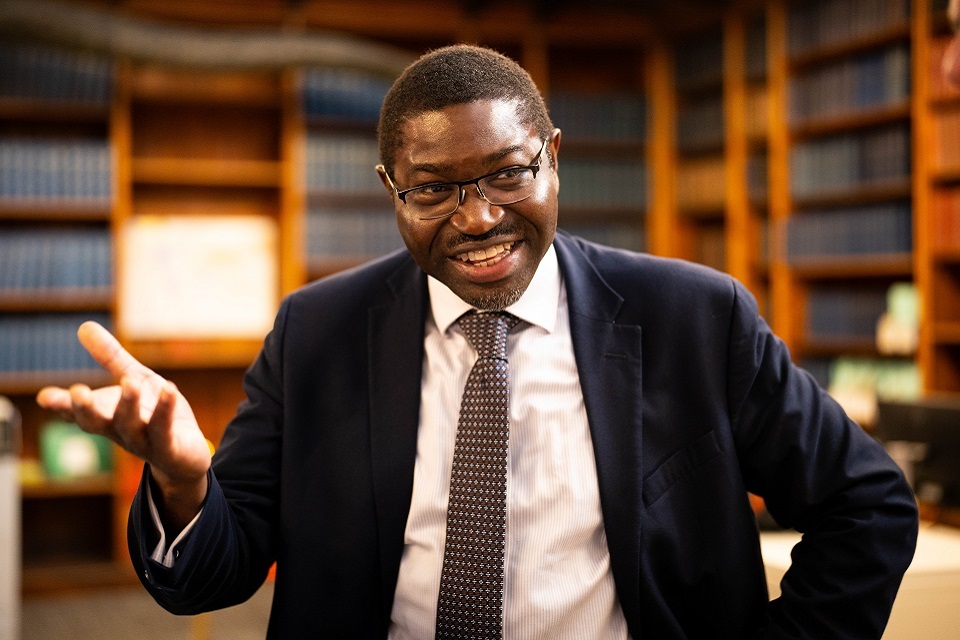
Selected litigation experience
International Court of Justice
- Application of the Convention on the Prevention and Punishment of Crime of Genocide (The Gambia v. Myanmar), Counsel for the UK as intervenors (2022 to date)
- Legal Consequences arising from the Policies and Practices of Israel in the Occupied Palestinian Territory, including East Jerusalem, Counsel for Japan (2022 to date)
- Land and Maritime Delimitation and Sovereignty over Islands (Gabon/Equatorial Guinea), Counsel for Equatorial Guinea (2021 to date)
- Armed Activities Case (Democratic Republic of Congo v. Uganda) Reparations Phase, Counsel and Advocate for Uganda (2018 to 2022)
- Chagos Islands Advisory Opinion, Counsel and Advocate for Zambia (2018)
The International Tribunal for the Law of the Sea
- The M/T “Heroic Idun” (No. 2) Case (Marshall Islands/Equatorial Guinea), Counsel for Equatorial Guinea
- The M/T “San Padre Pio” Case (Switzerland v. Nigeria) No. 2, Counsel and Advocate for Nigeria (2019 to 2021)
- The M/T “San Padre Pio” Case (Switzerland v. Nigeria), Provisional Measures, Counsel and Advocate for Nigeria (2019)
International Criminal Court
- Provided confidential advice to the Office of the Prosecutor on international law arguments to be put to the Court (2019)
- The Prosecutor v. Al Hassan Ag Abdoul Aziz Ag Mohamed Ag Mahmoud (international law expert for Defence Counsel) (2020)
Arbitral and International Trade Tribunals
- Expert instructed by applicants (Arbitration under the OIC investment agreement, 2024)
- Adviser to an Asian State in 2 World Trade Organization Dispute Settlement Panels (2020 to 2023)
- Enron Nigeria Power Holding Ltd (Cayman Islands) v. Lagos State Government Nigeria; Power Holding Company of Nigerian and Federal Republic of Nigeria International Chamber of Commerce Arbitration in London: Expert, instructed by claimants (2007)
- African Court on Human and Peoples’ Rights
- Democratic Republic of Congo v. Rwanda (Application No. 007/2023) Counsel and Advocate for Rwanda (2023 to date)
European Court of Human Rights
- Hanan v. Germany (Grand Chamber) (Counsel and Advocate for applicant, 2019 to 2020)
- Sydorenko v. Ukraine and Russia; Obukhivskyy v. Ukraine and Russia; Vakhovskyi v. Ukraine and Russia (Adviser to the applicants, 2016)
UN Human Rights Committee
- Oleksiv and others v. Russian Federation (Expert instructed by Victims, 2024)
National Courts
- From 1998 to present, engaged as Counsel, Adviser or Expert in several cases before national courts and tribunals, including the Supreme Court, in England, the United States, New Zealand and Pakistan
Selected advisory experience for international organisations and States
United Nations
- Adviser to World Food Programme on international law and conflict‑induced hunger (2019 to 2022)
- Office of the Coordinator for Humanitarian Affairs on the law relating to humanitarian relief operations (2013 to 2016)
- Food and Agriculture Organization on questions concerning the law of international organisations (2019)
- UN Special Rapporteur on Extrajudicial Executions on a report for the General Assembly on “Drones, Right to Life and Targeted Killings” (2014)
- Joint Opinion for UN Resident Coordinator in Palestine (2017)
Commission of the African Union
- Member, Technical Working Group, Advisory Opinion from the International Court of Justice on Immunity of Heads of States (2018 to 2019)
- Consultant, Advisory Opinion from the International Court of Justice on Immunity of Heads of States (2013)
- Consultant, Review of the Statute of the International Criminal Court (2009)
- Consultant, African Comprehensive Anti‑Terrorism Model Law (2005 to 2006)
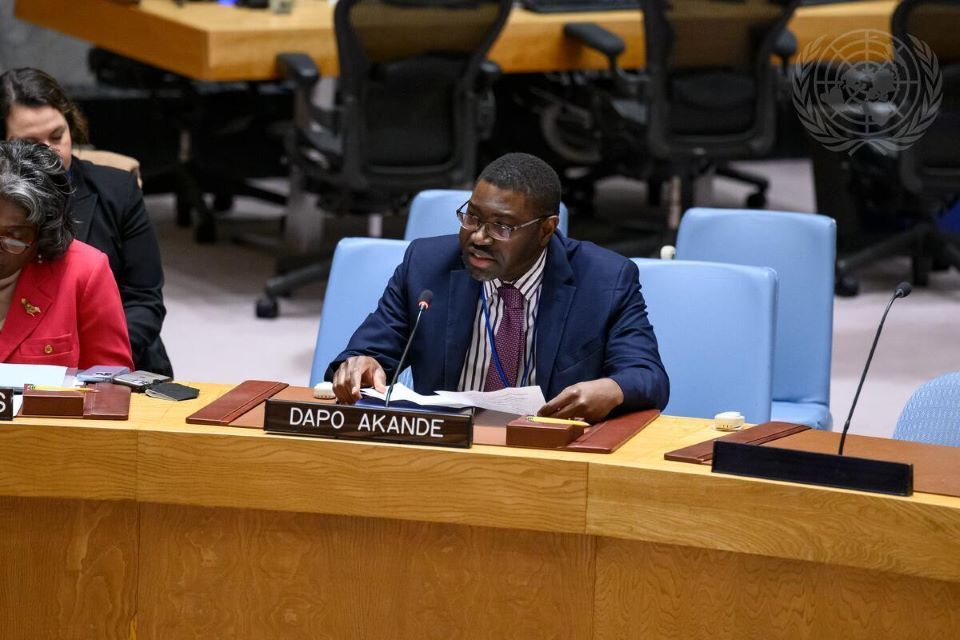
Professor Dapo Akande speaking at the United Nations.
Other international organisations
- International Committee of the Red Cross: Member of the Global Advisory Board on Digital Threats During Conflict (2021 to 2023)
- NATO: Joint Opinion for the Office of the Legal Adviser (2023)
- Member, International Group of Experts on the Tallinn Manual on the Law Relating to Cyber Operations, NATO Cooperative Cyber Defence Centre of Excellence (2015 to 2016)
- Organization of American States: Joint Opinion for the Secretary General on an issue before the International Criminal Court (2020)
- Council of Europe: Committee of Legal Advisers on Public International Law Working Group on Securing Payment of Just Satisfaction (2024)
- Commonwealth Secretariat: Consultant on Handbook on International Humanitarian Law (2013); Member, Expert Working Group on the review of the Commonwealth’s Model Law on the Implementation of the Rome Statute of the International Criminal Court (2011)
- Botswana: Attorney General’s Office, assisted with drafting of legislation to implement obligations under the Statute of the International Criminal Court (2010 to 2013)
- Chile: provided confidential opinions on discrete issues of international law (2021)
- Estonia: Ministry of Foreign Affairs, Tallinn Workshop on International Law and Cyber Operations (2022)
- Japan: Adviser on international law issues (2020 to date)
- Philippines: Ministry of Foreign Affairs on behalf of ASEAN/China Joint Working Group on Declaration on the Conduct of Parties in the South China Seas (2015)
- Ukraine: Office of the President and Ministries of Foreign Affairs and Justice, Adviser on establishment of a special tribunal for the crime of aggression against Ukraine and member of the Presidential Working Group on the establishment of mechanism to secure reparations (2022 to date)
- UK: Foreign, Commonwealth and Development Office (several matters); Ministry of Defence AI Ethics Advisory Panel (2020 to 2022); UK Department of International Trade; All Party Parliamentary Group on Drones, Legal Adviser on Inquiry into the UK’s collaboration with Partners on the use of drones (2015 to 2018); Written Evidence, Joint Committee on Human Rights Inquiry into Use of Drones for Targeted Killings (2016); Opinion on The Legality of the UK’s Air Strikes on the Syrian Government (2018)
- United States: Department of State, Member of the Advisory Committee on International Law (2021 to date)
Government training
- Involved in organising and delivering training for lawyers and government officials from across the world on matters of international law
Selected keynote or named lectures
International organisations
- UN (Security Council): Arria Formula Meeting on “The Contribution of the International Criminal Court to the Maintenance of International Peace and Security” (2023); Ministerial Open Debate on “Rule of Law Among Nations” (2023); High Level Open Debate on “Strengthening Accountability for Serious Violations of International Law” (2022)
- UN: UN Audiovisual Library of International Law (2011 to date); UN Regional Courses on International Law (2018 to date); Council of Europe: Committee on Public International Law, Public International Law aspects of the Russia/Ukraine Conflict (2022); International Law and Cyber Operations (2022)
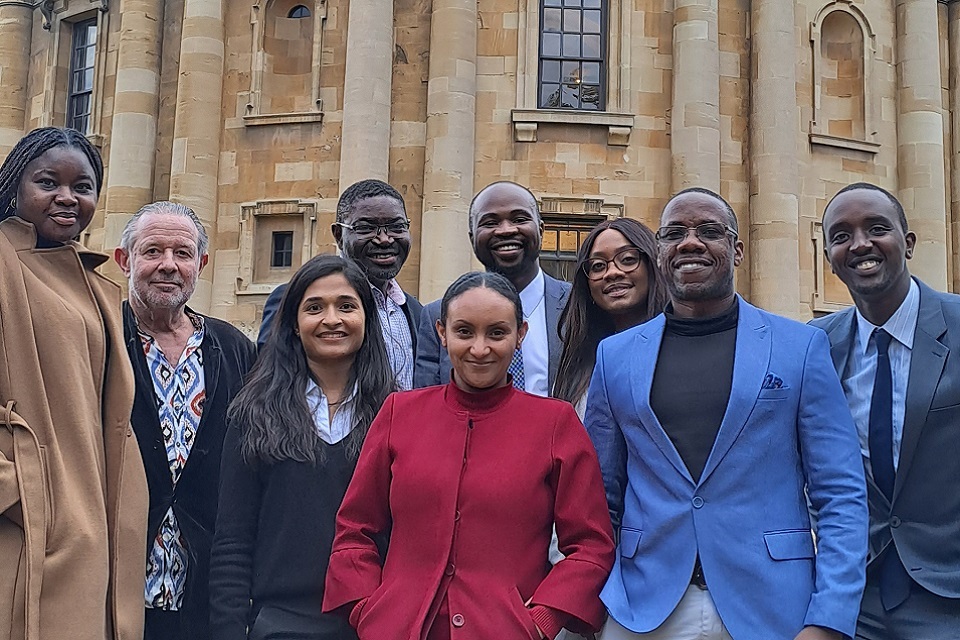
Professor Dapo Akande teaches visiting lawyers on the International Lawyers for Africa programme.
States
- Japan: Tokyo International Law Seminar (2023)
- UK: Government Legal Profession International Law Conference on the Russia – Ukraine Conflict (2022)
- Government Legal Service, inaugural International Law Conference (2014)
- Singapore: Public International Law Lecture, Attorney General’s Chambers (2022)
- Republic of Korea: Seoul Academy of International Law (Korean National Diplomatic Academy) (2018 to 2022)
Academic institutions
- Distinguished Professorial Address, University of the West of England (2019)
- Annual Ruth Steinkraus‑Cohen International Law Lecture (2018)
- Inaugural Thornberry Lecture in International Law and Human Rights, University of Keele (2015); Susan N. and Augustus DiZerega Lecture, George Washington University Law School/Zoryan International Institute for Genocide and Human Rights Studies (2015)
- Sir Ninian Stephen Visiting Fellow Lecture, Asia‑Pacific Centre for Military Law, University of Melbourne (2015)
Other organisations
- Global Arbitration Review Live: BITs Conference (2022)
- Winston & Strawn/London Conference on International Law Keynote Lecture (2022)
- Canadian Council of International Law Annual Meeting (2019)
- Distinguished Discussant, Grotius Lecture, American Society of International Law Annual Meeting (2018)
- International and Comparative Law Quarterly Annual Lecture (2017)
Selected membership of boards, academic journals and organisations
- Founding Member and Editor, EJIL:Talk! (2008 to date)
- Member, International Advisory Panel, Project on Restatement (Fourth) of Foreign Relations Law, American Law Institute (2023 to date, 2014 to 2018)
- Member, Board of Trustees, Rhodes Trust (2020 to date)
- Member, Africa Group for Justice and Accountability (2016 to date)
- Advisory Board Member, Israel Law Review (2015 to date)
- Advisory Board Member, Ethiopian Yearbook of International Law (2015 to date)
- Member, Advisory Board, International Law Studies (2013 to date)
- Editorial Board Member, American Journal of International Law (2013 to date)
- Member, Advisory Board, International Centre for Transitional Justice (2011 to date)
- Trustee, British Institute of International and Comparative Law (2017 to 2020)
- Member, World Economic Forum, Global Council on the Future of Human Rights (2016 to 2018)
- Member, Legal Advisory Board, Protect Education in Insecurity and Conflict (Qatar) (2010 to 2013)
- Member, Scientific Advisory Board, then Editorial Board, European Journal of International Law (2007 to 2017)
- Member, Editorial Board, African Journal of International and Comparative Law (2007 to 2013)
Selected publications
Books
- ‘The Individualisation of War: Ethics, Law and Politics’ (Welsh. Akande & Rodin, eds. 2023)
- ‘Oxford Guide to International Humanitarian Law’ (Saul & Akande, eds. 2020)
- ‘Human Rights and 21st Century Challenges: Poverty, Conflict and the Environment’ (Akande, Kuosmanen, McDermott & Roser, eds. 2020)
- ‘Oppenheim’s International Law: The United Nations’ (with Higgins, Webb, Sivakumaran & Sloan, 2017)
- ‘Tallinn Manual 2.0 on the International Law Applicable to Cyber Operations’ (Member of International Group of Experts, 2017)
- ‘Practitioner’s Guide to Human Rights in Armed Conflict’ (Oxford University Press, 2016) (Consultant Editor, with Murray, Garraway, Hampson, Lubell & Wilmshurst)
- ‘Oxford Companion to International Criminal Law and Justice’ (editor, with Cassese et al, 2009)
Book chapters and journal articles
- ‘Armed Conflicts and Investor-State Disputes’ (2023), 38 ICSID Review – Foreign Investment Law Journal
- ‘Drawing the Cyber Baseline: The Applicability of Existing International Law to the Governance of Information and Communication Technologies’ (2022) ‘99 International Law Studies 4’ (with Talita Dias & Antonio Coco)
- ‘The Right to Life and the Jus ad Bellum: Belligerent Equality and the Duty to Prosecute Acts of Aggression’ (2022) 71 International and Comparative Law Quarterly 453 (with Miles Jackson)
- ‘Economic Sanctions, International Law, and Crimes Against Humanity: Venezuela’s ICC Referral’ (2021), ‘115 American Journal of International Law 493’ (with P. Akhavan & E. Bjorge)
- ‘Use of Force in Self-Defence to Recover Occupied Territory’ (2021) ‘32 European Journal of International Law 1299’ (with A. Tzanakopoulos)
- ‘Implications of the Diversity of the Rules on the Use of Force for Change in the Law’ (2021), ‘32 European Journal of International Law 939’ (with Katie Johnston)
- ‘Conflict-induced Food Insecurity and the War Crime of Starvation of Civilians as a Method of Warfare: The Underlying Rules of International Humanitarian Law’ (2019) Journal of International Criminal Justice (with Emanuela-Chiara Gillard)
- ‘Treaty Law and ICC Jurisdiction over the Crime of Aggression’ (2018), 29 European Journal of International Law 939 (with Antonios Tzanakopoulos)
- ‘The Immunity of Heads of States of Non‑parties in the Early Years of the ICC’ (2018), ‘112 American Journal of International Law Unbound 172’
- ‘Arbitrary Withholding of Consent to Humanitarian Relief Operations in Armed Conflict’ (2016) ‘92 International Law Studies 483’ (with Emanuela-Chiara Gillard)
- ‘The International Law Framework Regulating the Use of Armed Drones’ (2016) ‘65 International and Comparative Law Q 791’ (with C. Heyns, L. Hill‑Cawthorne & T. Chengata)
Prizes, awards and honours
- Ambassador’s Commendation, Government of Japan (2024)
- Certificate of Merit for High Technical Craftsmanship and Utility to Practicing Lawyers and Scholars, American Society of International Law (2019)
- Premio Regione Toscana Giorgio La Pira Prize, Journal of International Criminal Justice (2003)
- Junior Award of the International Affairs Sub‑Committee of the Gilbert Murray Trust (1995)
Education
- University of Oxford, MA (2004, awarded by resolution)
- London School of Economics and Political Science, LLM (1994)
- Nigerian Law School, qualified as a Barrister and Solicitor (1993)
- University of Ife (Nigeria), LLB (1992)
If you would like further information on Professor Akande’s candidacy for the ICJ, please contact: Foreign, Commonwealth and Development Office, DLMultilateralElections@fcdo.gov.uk
